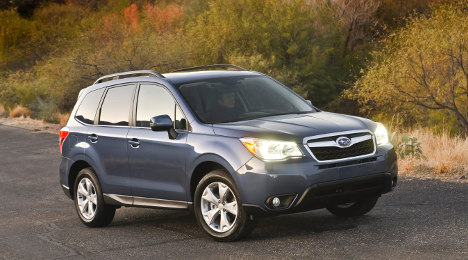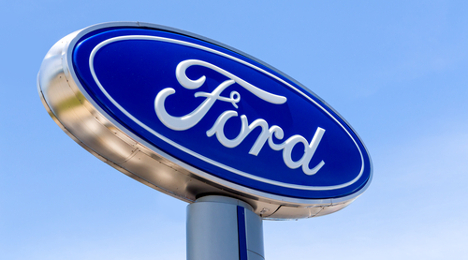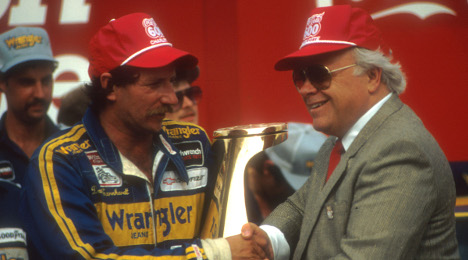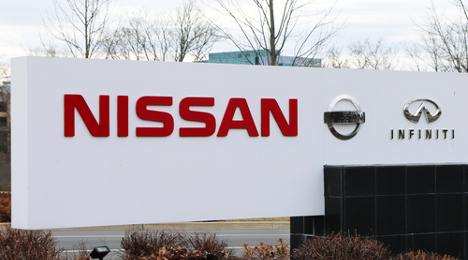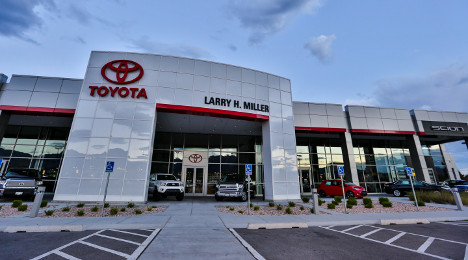Lithia Motors announced on Friday it has added a new Subaru store to its store count in California.
The dealer group has acquired Riverside Subaru of Riverside, Calif., which will be renamed DCH Subaru of Riverside. This is the first DCH acquisition for the company, after Lithia acquired DCH Auto in 2014.
The company shared this purchase will garner $45 million in estimated annual revenues.
Bryan DeBoer, Lithia president and chief executive officer, said, "We are pleased to announce the first west coast acquisition within our metropolitan market strategy with DCH Subaru of Riverside. Subaru is a valued partner and we are excited to enhance our strong relationship.
“Our combination with DCH provided over 1,400 metropolitan store acquisition targets in addition to over 1,200 acquisition targets within Lithia markets. We look forward to continued acquisition growth in the future,” he continued.
This news comes after Lithia announced in early January it purchased Barton Chrysler Jeep Dodge Ram Alpha Fiat, located in Spokane, Wash.
AutoNation’s fourth quarter results are in as of Thursday – and taking a look at its consolidated used-vehicle units retailed, the United States’ largest automotive group moved 53,920 used vehicles last quarter, a slight, 386-unit increase over Q4 2014.
Those sales contributed to a total of 227,290 used units sold for all of AutoNation’s stores in 2015, a 5.8-percent increase over the previous year (when the group sold 214,910 used units).
The group’s used-vehicle revenue, including used vehicles both retailed and wholesaled, increased by 4.4 percent in Q4 2015 (compared to Q4 2014) to roughly $1.15 billion. By the same metric, AutoNation’s full-year used-vehicle revenue came in at roughly $4.77 billion, an 8.7-percent increase compared to the full-year results for 2014.
However, AutoNation did experience decreases in both new- and used-vehicle gross profits last quarter. Used-vehicle gross profit, also including both retail and wholesale used vehicles, fell year-over-year by 14.6 percent to $75.7 million last quarter. By the same metric, the group’s full-year 2015 gross profit for used vehicles fell by 1.9 percent to $353.7 million, compared to 2014’s results.
Mike Jackson, AutoNation’s chairman, chief executive officer and president, summed up the group’s overall condition in a statement included with the company’s 2015 results.
"In the fourth quarter, new and used vehicle margins on a combined basis declined by $217 per vehicle retailed, or 11 percent, as compared to the fourth quarter of 2014,” Jackson said. “As of year-end, our new vehicle inventories increased 13 percent on a same store basis, as compared to the prior year, driven by a 49 percent increase in premium luxury inventories. We have begun, and will continue through the first quarter, to take the necessary steps to align our costs, inventory, and pricing strategy to adjust to the current market."
Gross profit per used unit retailed was down slightly on both a quarter-over-quarter and year-over-year basis, ending the year at an average of $1,441 per vehicle in Q4 and $1,577 per vehicle for the year.
Looking at the company’s overall gross profit mixes, used-vehicle sales made up 10.8 percent of AutoNation’s mix for the year, down from 12.1 percent in 2014. From a retail perspective, AutoNation continues to make the majority of its profits from parts and service (41 percent of the mix in 2015), F&I (26.6 percent) and new-vehicle sales (20.6 percent).
AutoNation closed the year with 43 days of used-vehicle supply.
Editor's Note: For more insight into AutoNation's Q4 and full-year results, stay tuned to Monday's Auto Remarketing Today.
Ford Motor Co. announced Tuesday that all Ford Rangers from model years 2004 to 2006 are now recalled for potentially faulty driver-side airbag inflators. This follows news of an estimated 5-million-vehicle expansion of the series of Takata airbag inflator recalls revealed Friday
Ford's action affects a total of 391,394 Rangers, 361,692 of which are in the United States and its territories while 29,334 are in Canada.
A release from Ford says that the company is aware of one report of a death related to a Takata airbag deployment.
The National Highway Traffic Safety Administration discussed the expanded Takata recall in a conference call with the media on Friday, pointing to the fatality of a South Carolina man whose death was linked to an airbag rupture during a wreck involving his 2006 Ranger in S.C. in late December.
According to Gordon Trowbridge, NHTSA's communications director, the recall expansion is due to both this fatality, which he classified as a "field rupture" involving a Takata SDI model inflator, as well as test data showing ruptures in Takata PSDI-5 model inflators.
“That makes that crash the ninth Takata-related fatality in the United States and the 10th globally,” Trowbridge said. “All of these deaths are tragic. There is nothing that we at NHTSA can say or do that will lessen the pain for the affected families. And this latest news is a sad reminder of the immense scope of this problem and why we need to take unprecedented steps to resolve it.”
The model year 2004-2006 Rangers were already under recall for defects in their Takata-sourced passenger-side airbag inflators.
In email correspondence with Auto Remarketing, Trowbridge said that NHTSA believes that Takata's recent filing involving its PSDI-5 model inflators will affect Honda, Audi, BMW, Mercedes Benz, Saab and Volkswagen. The filing involving its SDI model infaltors are expected to affect Audi, Daimler Trucks, Ford, Mazda and Volkswagen.
The man behind Sonic Automotive and Speedway Motorsports, O. Bruton Smith, was inducted into the NASCAR Hall of Fame on Saturday, recognized for his decades of dedication to the motorsports world.
Smith is currently the executive chairman and director at Sonic Automotive, based in Charlotte, N.C. He founded Speedway Motorsports Inc. (SMI) in 1994, which became the first motorsports company to be publicly traded on the New York Stock Exchange a year later.
“Being inducted into the NASCAR Hall of Fame is truly an honor,” Smith said. “For nearly 60 years, my life’s work has been to build first-rate facilities and host world-class events for fans around the country. Along with thousands of my employees, I have worked hard for the fans in hopes of providing each of them a truly unforgettable experience every time they walk through the gates. When I say, ‘we work for the fans,’ I really take it to heart. I look forward to seeing Speedway Motorsports continue to lead the way in innovation and fan fun for many years to come.”
Those more familiar with his motorsport proclivities will know Smith as the chairman, chief executive officer, director and controlling stockholder of SMI, the latter which owns Atlanta Motor Speedway, Bristol Motor Speedway, Charlotte Motor Speedway, Sonoma Raceway, Las Vegas Motor Speedway, New Hampshire Motor Speedway, Texas Motor Speedway and Kentucky Speedway.
A North Carolina native born in Oakboro, Smith began construction of what is now known as the “home track” of NASCAR, Charlotte Motor Speedway, in 1959. The next year, it was home to NASCAR’s first 600-mile race, the World 600.
SMI’s eight raceways are also home to Smith’s Speedway Children’s Charities, which was founded in 1982 to care for children in financial, educational, social and medical need in order to help them lead productive lives. The Speedway Children’s Charities has donated more than $46 million to other charities nationwide since its founding.
Other inductees from Saturday include the legendary drivers Jerry Cook, Bobby Isaac, Terry Labonte and Curtis Turner.
The Zeigler Automotive Group announced Tuesday the opening of two new stores — one Nissan and one Infiniti dealership — in Orland Park, Ill.
Side-by-side and named Orland Park Nissan and Orland Park Infiniti, the two stores opened on Jan. 7.
Zeigler AG cited the strength and growth of the two brands as the reasoning behind the purchase of the two franchises.
"Nissan and Infiniti are great brands and Orland Park is a great city," said Aaron Zeigler, president of Zeigler Automotive Group. "We've had outstanding success with BMW of Orland Park and wanted to expand our presence in the area; we are thrilled to add the new dealerships to our growing family of stores. Orland Park is a wonderful place to live and work, and we couldn't be happier to be an integral part of the community's continued development."
The two stores combined now offer over 400 new and 220 used vehicles. The group plans to add 20 new staff to the new dealerships.
BMW of Orland Park’s general manager Bill O’Hara now also serves as the general manager for both of the new locations.
Some of the amenities at the dealerships include spacious, modern showrooms and service areas, flat screen TVs, free Wi-Fi, complimentary beverages, retail areas, a playroom and an indoor car shop with air conditioned service bays.
With more than 235 model options in the new-vehicle marketplace, customers shopping in that arena are a bit spoiled for choice. Understanding what customers are drawn to, and, perhaps more importantly, turned off by, can be what sets a good car apart from a great car.
That’s where the annual J.D. Power Avoider Study comes in, and this year its analysis has shown an increased concern for vehicle reliability.
According to the study, which surveyed nearly 26,500 owners who registered a new vehicle in April and May of last year, 55 percent said that vehicle reliability was a leading reason for their purchase, up from 51 percent in the previous year’s study.
Looking at it from the opposite angle, 17 percent said perceived reliability was a chief reason why they avoided a certain vehicle, versus 14 percent the previous year.
"Though vehicle reliability and durability have improved significantly over the years, they remain a vital consideration for consumers," said Dave Sargent, vice president, quality practice, J.D. Power. "With so many auto recalls in the news and challenges with the introduction of new technology, consumers are even more attuned to the expected reliability of new vehicles.
“This impacts which models consumers avoid and which ones they ultimately purchase,” he continued. “Bad news can tarnish an automaker's reputation in an instant, yet, can take years to build back up. Automakers need to convince consumers of the true reliability of their vehicles so it is not a reason to avoid selecting a particular model."
Above reliability, exterior and interior styling still remain the top two most frequently cited reasons for buying a vehicle.
Lower gas prices also appear to have made an impact on consumer preferences, as J.D. Power points out that 51 percent of shoppers factored in fuel economy when purchasing their vehicle in 2015, down from 55 percent in the previous year.
Although nothing new, another issue that has stuck around is the fact that some shoppers tend to change brands because they simply want to try something new.
"This is a major challenge for auto marketers," Sargent said. "In the auto industry, building consumer trust, loyalty and advocacy is paramount to ongoing success. However, there are so many great vehicles available to consumers that merely satisfying your customers is simply the cost of entry.
“To truly succeed, automakers must keep their exterior and interior designs fresh, ensure competitive performance and fuel economy levels, offer an array of advanced technology and achieve an excellent reputation for vehicle reliability."
Here are a couple more key findings from the report, as listed by J.D. Power:
- Car Buyers Doing Less Window Shopping: Since 2012, new-vehicle buyers are considering fewer models and shopping fewer dealers. On average, buyers physically shop only three models, one of which they buy.
- Domestic Brands vs. European and Asian Brands: There remains a significant disconnect between perception and reality regarding the reliability of domestic brands compared with European and Asian brands. Avoidance of domestic models due to reliability concerns (24 percent) is nearly twice that of European (13 percent) and Asian (12 percent) models. In reality, the actual reliability of most domestic models is competitive with that of their import competitors.
Many companies, including dealerships, tend to tout company culture as part of their recipe for success.
Not very many, however, tend to survive three generations of familial torch bearing and reap the rewards quite in the same way as Ohio’s Ricart Automotive Group.
It started with Paul Ricart on Independence Day in 1953 as a single-point Ford franchise in Canal Winchester, Ohio — with four cars and one garage.
And these days? In late 2015, the dealer group was expecting to have retailed roughly 8,500 used vehicles out of its Ricart Used Car Factory by the end of the year.
As part of this year’s “Leading Dealer Groups” issue, Auto Remarketing spent some time talking with Rick Ricart, third-generation member of the group as well as its current vice president of sales and marketing, to see if he could share some sales tips.
Cutting straight to the issue, we asked Ricart what his group’s overall sales strategy is, distilled down into one statement.
“We are very, very consistent with everything we do. We have consistent training. We have a consistent culture,” Ricart said. “But we are dynamic when it comes to each individual customer as we engage them because there are so many types of buyer today depending on how much research they’ve done and everything.
“I would say our strategy is, ‘sustainable growth through consistent processes, by treating each individual customer based on their needs and demands.’”
Well, that seems to make sense — consistent culture, dynamic approach to customer service — but how is that achieved? To start off, Ricart says one key to obtaining quality sales men and women for his new and used stores is to, well, not hire people who have done it before.
“Four years ago now, I adopted a policy where we don’t hire car salesmen,” he said.
How does that work? For starters, Ricart says they don’t hire the “transient” car salesmen that tend to bounce around from dealership to dealership, spending six months or so at one business before moving on to the next — an issue that he says has plagued the Columbus area in the past.
“What we decided was we were sick of hiring people that had been taught bad habits, that had been taught to lie, cheat and steal,” Ricart said. “What we really need are people that are focused on customer service and that don’t have the entitlement of a lot of millennials that refuse to work 40 hours a week, or work weekends, or work nights. So four years ago we took a strategic move and started hiring from the service industry.”
That’s right — former servers, bartenders, hotel front-desk staff, valets — that’s the Ricart sales staff’s bread and butter.
“We found people that have the personality, the customer service training, the character — and brought them into the car business,” he said.
To Ricart, today’s business isn’t about learning how to be a salesman. It’s about letting the customer, who, more often than not, has come into the store following an incredible amount of research, take the reins and have the sales staff simply help them find what they’re looking for.
In fact, that’s exactly how Ricart’s management phrases it to their sales staff. Of Ricart’s 550 employees across its new and used stores, 62 are sales people in the Ricart Used Car Factory. And they’re not allowed to sell anything.
“That’s what we tell them all the time, ‘you’re not to sell a car today. But you’re to let two or three people buy a car that you meet,’” Ricart said.
‘Family owned and people driven’
That “internal tagline” is what Ricart attributes to his company’s cohesive culture — the reasoning behind its ability to retain many of its employees long term and give them a feeling of openness and honesty.
“We are very employee-centric. We don’t shun them for sharing ideas, criticism,” he said. “We let our employees take ownership in their job and the dealership itself. And we have a lot of long-term employees that help reiterate all of those culture-based programs that we do. And we actually have an in-store employee engagement director.”
In an environment where employees take ownership of their positions and care for the overall well-being of the business, Ricart says this helps make his job easier.
“It allows me to do my job better because I’m not worried about what I say, because everything is very honest and transparent and open with everyone,” he said. “Management truly defends the employees, as well.”
Another tip that Ricart gave for dealers is that if you want to build a fan base for your dealership, you have to start with your own employees.
“We learned years ago when we started our culture change that if the employees aren’t advocates of the dealership the customers never will be,” he said “That sounds crazy, but I remember five years ago there’d be someone that worked in the service department that didn’t want to buy a car from the company they worked for because they didn’t get along well with the used-car department.
“It gave us a lot of opportunity to improve those things. You need to make sure that every employee is proud of where they work.”
Success of the used-car recon department
Speaking with Auto Remarketing in late December, Ricart said the turn-time that week in the Ricart Used Car Factory’s reconditioning department was currently 5.2 days, with its peak at one point as low as 3.9 days. The recon team, which utilizes the Motor Trend Certified Vehicle program, tries to get each vehicle show-ready in less than four days so it can go into the “photo lab,” where each vehicle gains 27 high-quality photos and is put online for sale.
Ricart says he enjoys the program because, instead of having six different teams, one for each make, he has one team certifying all of the Factory’s vehicles. That one team, with 20 technicians designated to used vehicles, shares 14 service bays and performs the same inspection on each vehicle. He says the recon department has come a long way — when they first started tracking turn time on vehicles, they stood at 11 days.
The goal of “sustainable growth” is exactly what is reflected in his Used Car Factory’s sales figures. At the end of November, it had sold exactly 7,787 used vehicles in 2015, an over 700-vehicle increase over the first 11 months in 2014 (7,054 used-units retailed) and roughly tying the overall sales figure for 2014. Speaking conservatively, Ricart says the Factory was expected to end the year at 8,400 to 8,500 used units retailed, a 10-percent jump over last year’s figures.
Ricart says he knows the Factory could retail quite a bit more — but the focus is currently on quality over quantity.
“We’re looking for sustainable growth,” he said. “We could go buy a whole bunch of cars as cheap as we can and lose money to market them and say, ‘Hey, we sold 10,000 cars this year.’ But if you don’t sell 10,000 or more next year, then it was false pride, or whatever you call that.”
Not every dealership group can count the Utah Jazz as a sister company.
But like Karl Malone taking flight off a John Stockton bounce pass, the Larry H. Miller Dealerships organization is assisted by the cross-marketing opportunities of being under the same corporate umbrella as an NBA franchise.
LHM Dealerships is, of course, part of the Larry H. Miller Group of Companies, which includes everything from sports franchises and movie theaters to car dealerships and TV/radio stations, just to name a few verticals.
The larger company aims to “cross-promote each entity within the group,” said Rod Rowley, who is vice president of new and used inventory at LHM Dealerships.
So, that might be offering movie tickets as an added perk during a car sale.
Or showing commercials for the dealerships during a movie at one of the company’s theaters, Rowley told Auto Remarketing during a late December phone interview.
This mutually beneficial practice of one division using its talents and resources to help another can also be found within the LHM Dealerships organization itself.
Case in point, its inventory management approach to make sure the right used-car supply is at the right store.
The retailer has an internal daily report that shows the days’ supply at each store, Rowley said. This allows LHM Dealerships to focus on specific stores, as needed.
In other words, who needs inventory, who has too much.
The group also has an internal wholesale website it can use to send vehicles to other stores. Additionally, LHM Dealerships has approved wholesale accounts who can purchase inventory.
“So if we have a story with high inventory, we’ll move some cars to stores with a lower day’s supply, and we’ll also offer the inventory for sale wholesale, without having them leave the lot,” Rowley said.
The internal wholesale site, which the group runs itself, is called LHM Wholesale. And dealers outside the group can actually sign up to be part of it, Rowley said, and purchase frontline-ready cars from the retailer.
When it comes to acquiring used vehicles, Rowley said: “Our biggest focus is on our appraisal process within the store. The best inventory is what we trade for at the front door.”
The dealership group, especially over the last half of 2015, has put a big emphasis on building an appraisal process at each of its stores “that’s transparent and friendly with customers,” Rowley said.
During that same time frame, the retailer began an internal program called “appraisal central,” he added.
“The dealers can send any appraisal to the team of people we’ve hired that will give them a buy-bid on a car,” he said. “So, the theory behind that is, the appraisal central guys will see a car, they’ll have a vision for what dealership that car should go to, and then bid the car accordingly.
“We’re finding (that) we’re getting a little bit more money for cars.”
Top hurdles & opportunities for dealer groups
Auto Remarketing also talked with Rowley about what he sees as the opportunities and challenges for large dealership groups like Larry H. Miller in the used-car market for 2016.
Lead management, he said, has some potential that is “just enormous,” including areas like incoming leads and incoming phone calls.
As for the challenges for big dealer groups? Gross compression.
“We see that all the time; grosses are less and less with the competition that we have online to sell used cars,” he said. “It’s so much easier (now) for a small, independent guy to compete online just by price.”
At the close of the third quarter, our nation’s seven publicly traded dealer groups collectively averaged their 25th consecutive quarter of same-store used unit sales increases.
Cox Automotive’s chief economist Tom Webb, speaking during the Manheim Index Quarterly Conference Call on Friday, says a 26th is probable, but will be a challenge to achieve.
“Slide 14 shows the seven publicly trade dealership groups and it shows that they have had 25 consecutive quarters of same-store growth in used-units retailed,” Webb said, referring to slides accompanying his presentation. “Achieving the 26th quarter will be a little bit difficult because CarMax has already reported a 0.8-percent decline in their quarter, which ends in November.
“But I still think the 26th quarter will be achieved because CarMax was more focused on supporting gross than I believe that the others will be. Which, obviously, writes in the equation, that by extension, I expect the downward sloping lines in Slide 15 will also continue.”
And the latter slide, as you probably inferred, references the used-vehicle retail gross margin for the same publicly traded dealer groups. The gross margins for used sales for the public groups is currently trending to its lowest percentage in several years — a trend Webb says has two faces.
“Now, there are two ways of looking at that gross margin trend. One could just say it’s plain ugly, and it’s dangerous,” he said. “Or, you can argue that it’s just simply the case of a competitive industry passing on its efficiency savings to the consumer. Obviously the truth lies somewhere between the two.
“But more importantly, from my perspective, I do not believe that grosses should, and hopefully they won’t, go much lower. So that means don’t look for operating efficiencies at the retail level to continue to bail out the commercial consignors. The dealers have done more than their part,” Webb said.
He says dealership proficiencies have helped that margin decline due to the lowered costs of operation that result from such efficiencies.
“A lot of that reduction in gross, I wouldn’t say was ‘willingly’ given away, but because there were tremendous increases in operation efficiencies, other dealers were able to give it away,” Webb said. “The ability to keep achieving those operating efficiencies I think are a little bit limited going forward. And certainly the benefit of exceptional growth in the throughput has probably slowed it a little bit, too.”
For more takes on Webb’s analysis, including the used-car market’s current stretch of wholesale price stability, click here.
Penske Automotive Group has bought a 49-percent equity ownership stake in a luxury dealership group in Japan known as the Nicole Group. The multi-franchise retailer operates out of Kanagawa and Tokyo, and it features a Rolls-Royce store, a Ferrari store, four BMW stores and three MINI stores.
The Nicole Group also has two standalone service shops and two used-car showrooms and is the exclusive Japanese importer and distributor of BMW Alpina vehicles.
Penske said its statement in the company will be handled “an equity investment, with its pro rata share of income reported as equity in earnings of affiliates in its income statement.”
Group chairman Roger Penske said in the announcement: "We are thrilled with the opportunity to enter the Japanese market with a strong and established local partner. The Nicole Group represents world-class brands and has been named the best BMW dealership in Japan a record seven times.
“As imports continue to grow market share in Japan, combined with the group's solid reputation in the marketplace, we expect to leverage the strength of the existing business while driving further expansion through organic growth and future acquisitions,” he added.

